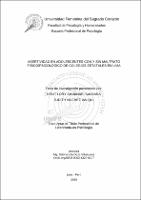| dc.contributor.advisor | Deza Villanueva, Sabina Lila | |
| dc.contributor.author | Ahuanari Saldaña, Kelit Lory | |
| dc.contributor.author | Vilchez Valqui, Judith | |
| dc.date.accessioned | 2020-09-26T21:00:34Z | |
| dc.date.available | 2020-09-26T21:00:34Z | |
| dc.date.issued | 2020 | |
| dc.identifier.uri | http://hdl.handle.net/20.500.11955/702 | |
| dc.description.abstract | El objetivo de la presente investigación es comparar la asertividad entre adolescentes con y sin maltrato familiar según dos tipos específicamente: físico y psicológico. El estudio es de diseño descriptivo comparativo. La muestra estuvo conformada por 290 estudiantes de ambos sexos desde tercero a quinto año de secundaria de instituciones educativas estatales en los distritos de Pueblo Libre y San Miguel en Lima Metropolitana. Los instrumentos utilizados fueron: el Autoinforme de la Conducta Asertiva (ADCA-1) elaborado por Manuel García y Ángela Magaz y el Cuestionario de Violencia Familiar (VIFA) de Livia Altamirano y Reyli Castro. Los resultados del estudio evidenciaron que existen diferencias significativas en el nivel de asertividad según el tipo de maltrato familiar. Los adolescentes que son víctimas de violencia psicológica tienen un nivel bajo de asertividad, al igual que los que son víctimas de violencia física y psicológica al mismo tiempo. El nivel promedio de asertividad se aprecia en los adolescentes que han sido víctimas de maltrato físico y el nivel superior en los que no han tenido ninguna forma de maltrato familiar. | es_PE |
| dc.description.abstract | The objective of this research is to compare assertiveness between adolescent victims and non-victims of family abuse according to two specific types: physical and psychological. The study is of comparative descriptive design. The sample was made up of 290 students of both sexes from third to fifth year of secondary school from state educational institutions in the districts of Pueblo Libre and San Miguel in Metropolitan Lima. The instruments used were: the Self-Report on Assertive Behavior (ADCA-1) by Manuel García and Ángela Magaz and the Family Violence Questionnaire (VIFA) by Livia Altamirano and Reyli Castro. The results of the study showed that there are significant differences in the level of assertiveness according to the type of family abuse. Adolescents who are victims of psychological violence have a low level of assertiveness, as do those who are victims of physical and psychological violence at the same time. The average level of assertiveness is seen in adolescents who have been victims of physical abuse and the highest level in those who haven’t had any form of family abuse | es_PE |
| dc.description.uri | Tesis | |
| dc.format | application/pdf | es_PE |
| dc.language.iso | spa | es_PE |
| dc.publisher | Universidad Femenina del Sagrado Corazón | es_PE |
| dc.rights | info:eu-repo/semantics/closedAccess | es_PE |
| dc.rights.uri | https://creativecommons.org/licenses/by-nc-nd/4.0/ | es_PE |
| dc.source | Repositorio Institucional - UNIFÉ | es_PE |
| dc.subject | Asertividad | es_PE |
| dc.subject | Maltrato de menores | es_PE |
| dc.subject | Adolescentes | es_PE |
| dc.subject | Lima (Perú: Departamento) | es_PE |
| dc.subject | Psicología --Tesis | es_PE |
| dc.title | Asertividad en adolescentes con y sin maltrato físico/psicológico de colegios estatales en Lima. | es_PE |
| dc.type | info:eu-repo/semantics/bachelorThesis | es_PE |
| thesis.degree.name | Licenciada en Psicología | es_PE |
| thesis.degree.grantor | Universidad Femenina del Sagrado Corazón. Facultad de Psicología y Humanidades | es_PE |
| thesis.degree.level | Título Profesional | es_PE |
| thesis.degree.discipline | Psicología | es_PE |
| dc.subject.ocde | https://purl.org/pe-repo/ocde/ford#5.01.01 | es_PE |
| renati.advisor.dni | 08741855 | |
| renati.advisor.orcid | https://orcid.org/0000-0003-4329-6107 | es_PE |
| renati.author.dni | 74471263 | |
| renati.author.dni | 43858264 | |
| renati.discipline | 313016 | es_PE |
| renati.level | http://purl.org/pe-repo/renati/level#tituloProfesional | es_PE |
| renati.type | http://purl.org/pe-repo/renati/type#tesis | es_PE |
| dc.publisher.country | PE | es_PE |


